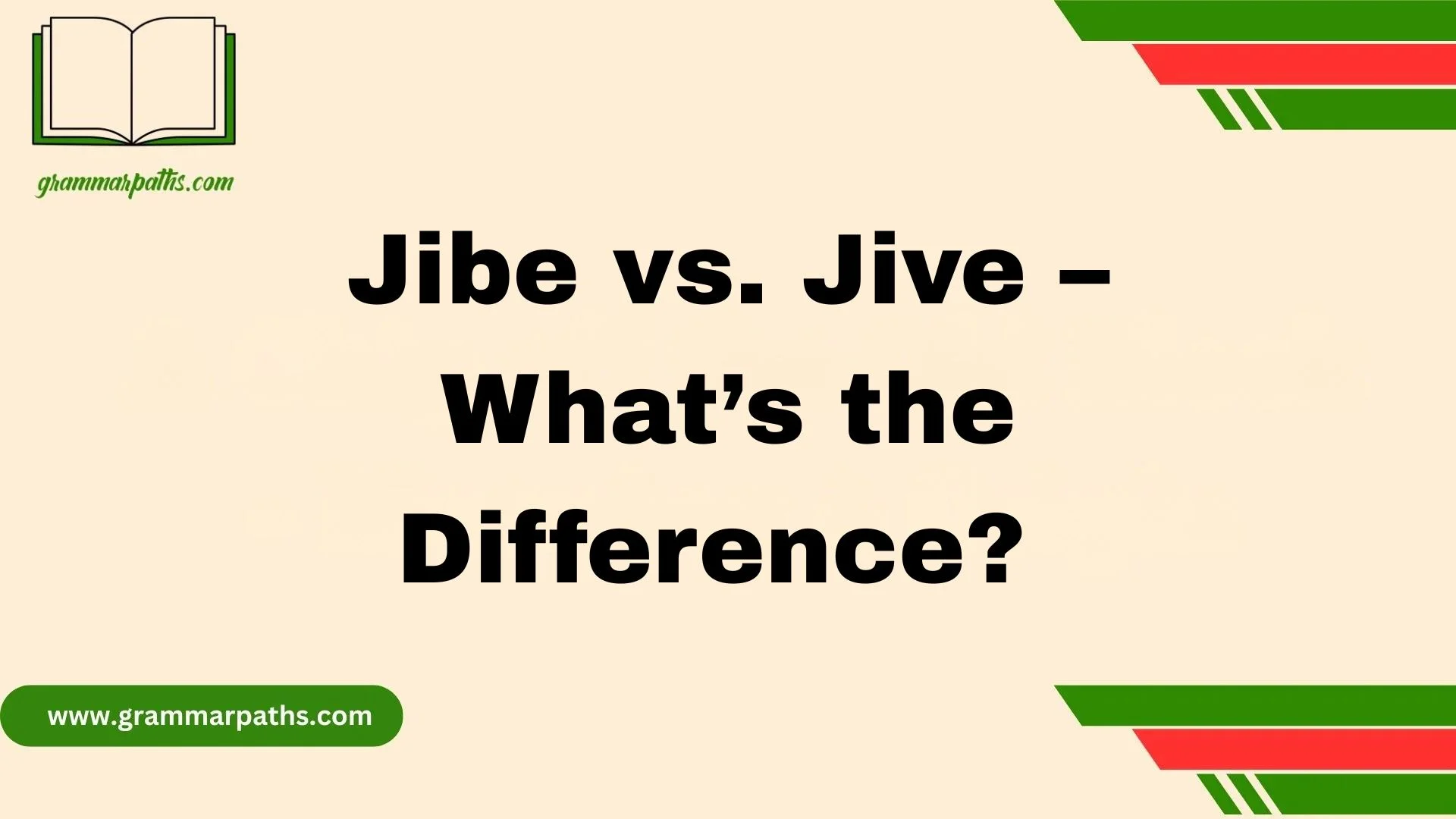When it comes to the English language, even simple words can create confusion if they sound alike but carry different meanings. One such pair that often trips people up is “jibe” vs. “jive.” At first glance, these two words might seem interchangeable, but in reality, they have very different definitions, usages, and contexts. Understanding this distinction is important for students, teachers, and professionals who want to use the right word with confidence.
The word jibe is commonly used to mean “to agree with” or “to be in harmony,” but it also has a nautical meaning related to sailing. On the other hand, jive is linked with slang, music, and informal conversation, often referring to playful talk, jazz culture, or even misleading information. Mixing these words up can lead to miscommunication and affect the clarity of your writing or speech.
This complete guide will break down the meanings, origins, examples, and proper contexts of jibe and jive. Whether you are writing an academic essay, teaching grammar, or giving a professional presentation, learning the difference between these two terms will sharpen your language skills and improve your communication.
Why People Confuse Jibe and Jive
Many people mix up jibe and jive because they are pronounced almost identically. This phonetic similarity makes it easy to guess the wrong spelling or meaning. Misuse can happen in emails, essays, or presentations, and it often changes the intended meaning completely.
For example:
- Incorrect: His explanation didn’t jive with the facts.
- Correct: His explanation didn’t jibe with the facts.
In the sentence above, using jive instead of jibe could confuse readers, because jibe means “to agree or align,” while jive usually refers to a style of dance or deceptive talk.
This confusion is even more prevalent in professional writing. Teachers, students, and professionals often encounter these words in essays, reports, or presentations. Misusing them can make your writing seem careless, even if the error is small.
Historical and Etymological Background
Understanding the origins of jibe and jive can clarify their meanings and usage.
The Origins of Jibe
The word jibe comes from nautical terminology, where it referred to the act of a sailboat turning its sails to align with the wind. Over time, it evolved to mean agreement or harmony, which makes sense if you think of sails lining up perfectly with the wind.
- First recorded use: 1590s
- Primary meaning: to align or agree
- Context: Often used in written communication or formal discussion
The Origins of Jive
Jive, on the other hand, has roots in African American vernacular and swing culture. Initially associated with music, dance, and playful speech, it eventually expanded to mean deceptive or nonsensical talk.
- First recorded use: 1930s
- Primary meaning: lively dance or playful speech
- Context: Informal communication, music, jazz, or slang
Table: Origins and Meanings of Jibe vs Jive
| Word | Origin | First Recorded | Primary Meaning | Context |
| Jibe | Nautical | 1590s | Agree, align, be consistent | Formal, writing, discussion |
| Jive | African American Vernacular / Swing Culture | 1930s | Dance, playful talk, nonsense | Informal, music, slang |
Understanding Jibe: Definition and Usage
Jibe is all about agreement and alignment. You can use it in professional, academic, and casual settings when you want to show that something matches, aligns, or is consistent.
Primary Uses of Jibe:
- Agreement: “Her story jibes with the witness’s account.”
- Consistency: “The data jibes with our predictions.”
- Alignment: “His actions jibe with his words.”
Tips to Remember Jibe:
- Think “jibe = align”.
- Picture a sailboat’s sails perfectly aligned with the wind.
Example Sentences:
- In academics: The student’s thesis jibes with the latest research findings.
- In professional writing: The budget report jibes with the company’s financial statements.
- Casual conversation: His story doesn’t jibe with what he told me yesterday.
Understanding Jive: Definition and Usage
Jive is quite different. It is informal, lively, and sometimes slangy. Its meaning depends on context: it can refer to dance, music, or playful/nonsense talk.
Primary Uses of Jive:
- Dance: “They danced the jive at the competition.”
- Music: “The band’s jive rhythms got everyone moving.”
- Slang / Deception: “Stop giving me that jive; I know the truth.”
Tips to Remember Jive:
- Think “jive = lively or playful”.
- Connect it to music, swing, and casual conversations.
Example Sentences:
- Music: The jazz band played an upbeat jive that had the crowd dancing.
- Slang: He’s full of jive, don’t believe everything he says.
- Dance: She learned the jive for the ballroom competition.
Common Mistakes and Misinterpretations
Even seasoned writers sometimes mix up jibe and jive. Misuse can confuse readers or reduce credibility.
Frequent Errors:
- Using jive when you mean agreement: His plan doesn’t jive with the facts. (Incorrect)
- Using jibe to describe dancing or music: They jibe all night at the club. (Incorrect)
Mini Case Study:
- A student wrote in an essay: The results jive with the hypothesis.
- Correction: The results jibe with the hypothesis.
- Impact: The incorrect word made the essay look careless, affecting grading.
Quick Correction Table:
| Misused Word | Correct Word | Example Correction |
| Jive (for agreement) | Jibe | “The data jibe with the report.” |
| Jibe (for dance/music) | Jive | “They performed the jive flawlessly.” |
| Jive (slang unclear) | Context-specific | “His jive talk confused the audience.” |
Usage in Popular Culture
Both words appear in music, movies, and literature, but in very different ways. Recognizing these uses can help you understand the meaning from context.
- Jibe: Often appears in formal writing, historical novels, or professional discussions.
- Jive: Common in jazz, swing music, movies depicting the 1930s–1950s, and informal dialogue.
Examples:
- Literature: “His story jibes with the evidence collected in the investigation.”
- Music: “Count Basie’s band played some classic jive tunes that defined the swing era.”
Understanding these references helps avoid misusing them, especially when teaching students or writing essays on cultural topics.
Practical Memory Tricks and Tips
Here are effective strategies to remember the difference:
Mnemonic Devices:
- Jibe = Align (think of aligning sails on a boat).
- Jive = Jumpy / Jazzy (think of dance and lively movement).
Analogies:
- Jibe: Like pieces of a puzzle fitting together.
- Jive: Like energetic dancing that doesn’t need to fit anything.
Exercises for Practice:
- Identify the correct word in sentences:
- The witness’s testimony ___ with the detective’s notes.
- Correct the errors in short paragraphs.
- Write your own sentences using jibe and jive in different contexts.
Why Proper Usage Matters
Using jibe and jive correctly ensures your writing is clear, professional, and credible. Misusing them can:
- Confuse readers or listeners.
- Affect grades or evaluations in academic contexts.
- Reduce professionalism in emails, reports, or presentations.
Example:
- Email Misuse: Your ideas don’t jive with the project goals. (sounds informal/slangy)
- Correct Version: Your ideas don’t jibe with the project goals. (professional, clear)
Proper usage reflects strong command of English, which is especially important for students, teachers, and professionals.
Quick Reference Cheat Sheet
| Word | Meaning | Example | Tip to Remember |
| Jibe | Agree, align, consistent | “The report jibes with the data.” | Align like sails |
| Jive | Dance, music, playful or deceptive talk | “She danced the jive at the party.” | Jazzy, lively |
This table is perfect for students studying English, teachers preparing lessons, or professionals reviewing writing tips.
Conclusion
Understanding the difference between jibe and jive is crucial for clear and effective communication. While jibe means “to agree with” or has a specific nautical meaning, jive is more connected to slang, music, and playful talk. Mixing them up might seem small, but in academic writing, teaching, or professional settings, the wrong choice can confuse your audience.
By remembering their distinct meanings, origins, and contexts, you can confidently use each word where it belongs. Whether you are a student crafting essays, a teacher explaining grammar, or a professional preparing reports, mastering this difference will sharpen your language skills and make your communication more precise.
FAQs
Q1: What does “jibe” mean?
A: Jibe means to agree with or be in harmony. It also refers to a specific sailing maneuver in nautical terms.
Q2: What does “jive” mean?
A: Jive refers to slang, playful or misleading talk, and is also linked to jazz music and culture.
Q3: Can I use “jibe” and “jive” interchangeably?
A: No. They have different meanings and should be used in their proper contexts.
Q4: Which word is correct in the phrase “that doesn’t jibe/jive with me”?
A: The correct word is “jibe” because it means “to agree with or fit in.”
Q5: Why do people confuse “jibe” and “jive”?
A: They are often confused because they are homophones—they sound similar but carry different meanings.

Emma Brooke is a passionate language expert and contributor at GrammarPaths.com, where she helps learners navigate the complexities of English grammar, idioms, and effective writing. With a strong academic background and years of teaching experience, Emma excels at turning tricky grammar rules into simple, practical lessons that readers can easily grasp.












